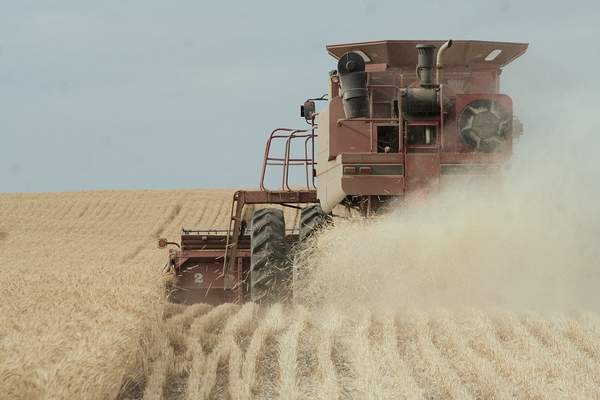forum
library
tutorial
contact

Wheat Leaders Talk About
Next Steps on Trade
by Matthew WeaverCapital Press, March 12, 2018
|
the film forum library tutorial contact |

|
Wheat Leaders Talk About
by Matthew Weaver |
U.S. Wheat Associates Chairman Mike Miller sand Washington Grain Commission CEO Glen Squires spoke
about next steps on trade following a commission board meeting in Spokane.
 SPOKANE -- The Washington Grain Commission will keep up the pressure on the Trump administration on trade, CEO Glen Squires said, emphasizing the negative impacts of the U.S. leaving the Trans-Pacific Partnership.
SPOKANE -- The Washington Grain Commission will keep up the pressure on the Trump administration on trade, CEO Glen Squires said, emphasizing the negative impacts of the U.S. leaving the Trans-Pacific Partnership.
The wheat industry has been concerned about the TPP since President Donald Trump withdrew from the trade deal last year. The remaining 11 countries -- including key U.S. wheat customers such as Japan -- signed the deal in Chile on March 8.
Also part of the TPP are Australia and Canada, which compete against U.S. wheat in Japan and elsewhere.
The National Association of Wheat Growers and U.S. Wheat Associates say U.S. exports to Japan are at serious risk. TPP will reduce the tariffs Japanese flour millers pay for imported Australian and Canadian wheat from $150 to $85 per ton over nine years, while the tariff on imported U.S. wheat will remain at $150 per ton.
However, the loss in market share and lower farmgate prices are likely to occur sooner, they say, as Japanese millers reformulate their product mix to avoid purchasing "artificially expensive" U.S. wheat.
The industry estimates an annual loss of $500 million for farmers, railroads, barge operators and grain handlers.
"The handwriting's on the wall -- if we're not part of that, we're going to lose that market share," Squires said. "(Japan doesn't) want to go some place else."
The commission is working with U.S. Wheat Associates, other states and Japanese customers to help convey the ramifications to Congress and the Trump administration, Squires said. Upwards of 90 percent of the wheat grown in the Pacific Northwest is exported.
"Our not participating in trade is a serious threat to our industry," Squires said. "Trade is our lifeblood."
The U.S. negotiating to re-enter the TPP would be a "win-win" for Trump and the wheat industry, Squires said.
"If anybody's going to be able to do a better deal in regards to our efforts, it's our president," said U.S. Wheat Chairman Mike Miller, a Ritzville, Wash., farmer and state commission member.
The trade issue comes at a time Congress is also dealing with pressing issues such as DACA for people who were brought to the U.S. illegally as children, gun control and the federal budget, Miller said.
Agriculture has a large contingent of support in Congress, he said.
"We have to just keep communication open, be willing to work and answer the bell when they call us," he said.
Miller said he believes the coalition is growing to include support industries for agriculture.
"One thing the United States has, whether it's the Pacific Northwest, Midwest or the Southeast, is we are still growing a commodity that the rest of the world wants to buy," he said. "If we get to the point where the world doesn't want what we build, or make, or grow, then we have a problem."
learn more on topics covered in the film
see the video
read the script
learn the songs
discussion forum
